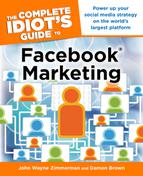Appendix
C
Facebook and the Social Media Playing Field
Facebook may be the most significant social network, but it certainly isn’t the only game in town. Here is info on Facebook, competing websites, and why they all matter.
When and how did Facebook begin?
Harvard University students Mark Zuckerberg, Eduardo Saverin, Dustin Moskovitz, and Chris Hughes founded the website in 2004. Created in their dorm rooms, Facebook was essentially a living yearbook that enabled students to connect with each other. In fact, for the first couple of years, Facebook required all members to have an email address ending in .edu.
Facebook focused on Harvard students, but Zuckerberg and his colleagues quickly realized that it could be a connection between universities, too. Stanford University was one of the first major schools Facebook connected with outside of Harvard. Nestled in Silicon Valley, Stanford got Facebook serious attention from the tech community. Zuckerberg eventually moved to Silicon Valley and assumed total control over Facebook in a very controversial breakup. His former colleague and friend Saverin successfully sued him for part ownership of the website.
How many visitors does Facebook have?
It has more than 800 million users, with almost 500 million unique website visitors daily. Nearly 50 percent of America is on Facebook, and more than 70 percent of American web users are on Facebook.
How much is Facebook worth?
As of June 2011, Facebook is valued at $100 billion. It earned an estimated $2 billion in 2010.
Is Facebook the only social network?
Hardly. There are more than 100 social networks on the web.
What exactly does a social network do?
A social network enables people to connect with like-minded individuals and to support and learn about their favorite brands.
What social networks are similar to Facebook?
There are several, but the most important ones include these:
• LinkedIn (www.linkedin.com): LinkedIn is geared toward corporate and entrepreneurial people. It makes it easy to get referrals from others for jobs as well as providing introductions between two business contacts.
• MySpace (www.myspace.com): Once the largest social network, MySpace still commands 33 million regular users. It has been a favorite spot for teens and musicians, the latter becoming even more prominent after singer Justin Timberlake invested in it in 2011.
• Orkut (www.orkut.com): Now owned by Google, Orkut was launched before Facebook and has a similar feel. It hasn’t made much of a splash in America, but it has more than 66 million users concentrated in India and Brazil.
• Plaxo (www.plaxo.com): Like LinkedIn, Plaxo is used often in the corporate world. Its big strength is the ability to organize all of your various contacts, on email or other mediums, in one place.
Isn’t Twitter a social network?
Not really. It’s a blogging platform that enables people to post messages. Although Twitter allows you to subscribe, or “follow,” certain people, it doesn’t have the more robust features of a social network like Profile pages, Wall posts, or group messaging.
That said, Twitter is still a valuable resource for businesses that want to create a constant presence and voice for the public.
Besides social networks, what else should I have in my online marketing plan?
We see six parts to the social media marketing field:
• Search
• Communities
• Social networks
• Reputation monitoring
• Blogs
Search is how easily people can find your brand online. The more easily you can be found, the better your search qualities. Much broader than social networks, communities can be developed in different environments. For instance, you can cultivate a community of people who connect online as well as in person. Email is one of the oldest online marketing mediums, and it enables you to directly contact individual customers. Reputation monitoring is actively searching the web to find out what customers think of your product, service, or brand. Finally, blogs give companies the opportunity to connect with tastemakers, and customers the chance to interact with their favorite brands.
Should I focus on a particular online marketing platform?
It’s okay to put most of your energy toward, say, the music-friendly social network MySpace if you’re going after performers, but a smart marketing plan always takes advantage of all six mediums in some form. Just be careful not to overextend your marketing commitment. You don’t want to do them all if it causes you to do them all poorly. Take on what makes sense for your organization.
